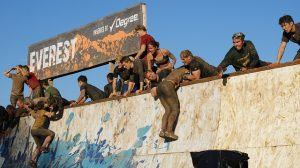I won’t cop out and say that you need a little bit of both. Certainly you require talent to achieve success, and few people succeed long term without hard work, but which contributes the most? 
A recent study published in the Personality and Social Psychology Bulletin showed that when rated by a group of 383 participants, entrepreneurs who demonstrated greater talent were more favored over those perceived as hard working but with less talent. A follow-up study showed that in order to be as appealing as those with natural talent, the hard workers would require 28 more IQ points and an additional four and one-half years of leadership experience.
People appear to value talent far more than hard work. This idea could not be more obvious in the sports world. Every year the NBA and NFL drafts are broadcast so fans can see if their team will land the most coveted talent which will turn around the ailing fortunes of their franchise. More often than not however, the talented young athlete which so dominated in college, flames out in the pros. ESPN recently released a list called “The Could Have Beens” in which sixty of their experts chose the top 25 athletes who failed to live up to their potential. Ever heard of Sam Bowie? He has the dubious misfortune of being the guy selected number two in the 1984 NBA draft ahead of Michael Jordan. Few remember him. Though many athletes on the ESPN list succumbed to career shortening injuries, many simply did not put in the hard work and effort. Despite this, year after year franchises gamble large paychecks on top talent for a quick fix, not realizing that players willing to put in the hard work are every bit as rewarding and often last longer.
“Grit” a book by Angela Duckworth, a professor of psychology at the University of Pennsylvania, suggests that a combination of passion and perseverance (grit) contributes more to success than intelligence or inherent talent. She provides a number of examples such as “gritty” children who studied and competed more in spelling bees, performed better in the Scripps National Spelling Bee. She also showed that West Point cadets who scored high on the grit scale were more able to endure the intensive seven week training program, Beast Barracks, through which they were put. Grit, in this instance, was a better predictor than SAT scores or athletic ability.
There are of course other contributors to success like a great coach or teacher Duckworth points out but effort is the key. She writes, “Our potential is one thing. What we do with it is quite another.”
Michael Phelps is the most decorated athlete in Olympic history. He is 6’4” with a 6’7” reach. His knees are double-jointed and his feet can rotate 15 degrees more than average which allow his feet to act more like flippers. His body is built for speed in the water! However his success is obtained through effort. In peak training mode Phelps swims 50 miles a week. He trains 5-6 hours a day, six days a week!
If you focus 30-35 hours a week on improving any skill whether it is writing, playing the piano, or giving presentations, your chances of succeeding improve exponentially.
